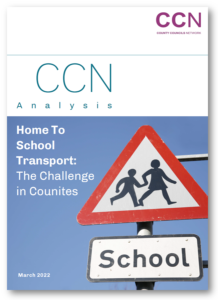
CCN Latest News, CCN News 2022 | 25 March 2022

The warning comes in a new report from the County Councils Network, which analyses pressures in home to school transport services. The local authorities that supplied data to this study transported 248,000 pupils for free last year, of which 51,000 were young people with special educational needs and disabilities (SEND).
The report, Home to School Transport: The Challenge in Counties, calls for short-term support for local authorities to help weather the storm of rising fuel prices, which has led to transport companies retendering for contracts up to 20% higher than last year.
 Download the report here.
Download the report here.
Because of the arrangements of some contracts, councils say local transport providers are exercising break clauses as they are paying significantly more in petrol and diesel. Local authorities are then retendering for these routes, but the retenders are coming back at significantly higher prices. If councils cannot pay these higher prices, then these routes will be handed back to the council, potentially impacting on thousands of pupils across England.
With petrol and diesel prices hitting record highs this month, councils say that smaller coach and minibus companies, alongside taxis, are most impacted. Due to their specific needs, many SEND pupils require these types of transport, with county authorities spending £244m on minibuses, private hire, and taxis last year.
Even before the fuel price increase, county authorities were facing yearly increases in costs in home to school transport services, particularly for SEND pupils.
Based on data from 28 county authorities, the report reveals:
Despite the Chancellor announcing a 5p fuel duty cut in Wednesday’s Budget, county authorities say more support will be needed in order to pay transport providers an increase, particularly for smaller companies and private hire firms. With councils having agreed their budgets for 2022/23 leaving little wriggle room, they argue a fresh injection of funding is necessary to avoid cutting services to make up the shortfall – or potentially leaving pupils without free transport.
The report concludes that the rise in SEND pupils becoming eligible for school transport is due to a spike in young people becoming eligible for Education, Health and Care Plans (EHCPs) as well as more young people attending special schools.
The number of pupils receiving EHCPs in the county areas profiled in today’s report rose from 90,305 in 2016 to 155,932 in 2021. If their EHCP specifies so, this entitles the SEND pupil to free transport to their closest suitable school. Government figures compiled as part of CCN’s analysis show that the number of pupils attending special schools has increased by 30% in county areas – from 34,711 in 2016/17 to 45,183 in 2020/21.
CCN says that the government’s SEND Review, which is due to conclude in the coming weeks, must set out a sustainable solution to address yearly rises in demand – and costs – for school transport, special school placements, and EHCPs.
 Cllr Keith Glazier, Children’s Services Spokesperson for the County Councils Network, said:
Cllr Keith Glazier, Children’s Services Spokesperson for the County Councils Network, said:
“Free school transport is a lifeline for many pupils, but local authorities have been placed in a difficult position owing fuel prices reaching record highs. Transport providers are understandably concerned they are paying much more than a year ago, but it means councils either pay the higher rates they are requesting or potentially see thousands of pupils unable to access free school transport, which is a statutory responsibility for local authorities.
“With our budgets set for the coming year, there is little wriggle room for local authorities, except to reduce other vital services. The Chancellor’s announcements this week will help, but we need further targeted financial support for councils to get them – and transport providers – through this uncertain period and give families the peace of mind that their children’s school transport will continue to run as normal.
“More broadly, today’s report showcases the challenge councils have in delivering school transport for pupils with SEND. As a result of these issues and wider financial pressures, councils have regrettably had to scale back eligibility for mainstream and discretionary home to school transport. We do not take these decisions lightly, but we have had little choice. The government’s SEND review must set out a sustainable solution to the rise in demand for SEND school transport, as well as addressing the root causes of the challenges of increased demand.”
Notes to editor
© 2024 County Councils Network | Credits | Site map | Cookies | Privacy Policy.